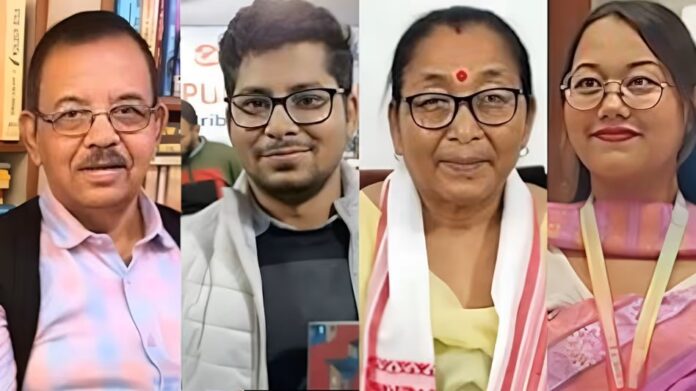The Sahitya Akademi Awards, considered one of the most prestigious literary honors in India, serve as a testament to the immense cultural and literary diversity of the nation. In 2024, Assam’s literary landscape shone brightly as three distinguished authors from the state were recognized for their exceptional contributions to literature. Sameer Tanti, Aron Raja, and Dipak Kumar Sharma emerged as torchbearers of Assam’s rich literary heritage, receiving accolades for their works in Assamese, Bodo, and Sanskrit, respectively. Their recognition not only celebrates their individual achievements but also underscores the depth and vibrancy of Assam’s literary traditions.
Sameer Tanti: Amplifying Contemporary Voices in Assamese
Sameer Tanti, a celebrated voice in Assamese literature, was honored for his work Pharingbore Bator Katha Jane (The Story Known by the Grasshopper’s Path). This work delves into contemporary societal issues, weaving narratives that resonate deeply with readers. Known for his evocative storytelling and ability to capture the intricacies of human emotions, Tanti has consistently elevated Assamese literature on the national stage.
Pharingbore Bator Katha Jane explores themes of identity, displacement, and the human connection with nature. Through vivid imagery and lyrical prose, Tanti paints a portrait of Assam’s socio-cultural fabric, juxtaposing its natural beauty with the struggles of its people. His ability to address pressing issues while maintaining a poetic narrative has earned him widespread acclaim. This award not only acknowledges Tanti’s literary prowess but also draws attention to Assamese literature as a powerful medium of expression.
Aron Raja: Preserving Bodo Heritage Through Literature
The Bodo literary community celebrated a landmark achievement as Aron Raja was awarded for his work Swrni Thakhai (Golden Dusk). Writing in Bodo, one of Assam’s indigenous languages, Raja’s work exemplifies the importance of preserving and promoting regional languages through literature.
Swrni Thakhai is a poignant exploration of the Bodo community’s traditions, struggles, and aspirations. Raja’s narrative bridges the gap between the past and present, reflecting the cultural ethos of the Bodo people while addressing contemporary challenges such as modernization and identity preservation. By focusing on stories rooted in local experiences, Raja’s work has not only resonated with the Bodo community but has also introduced their rich heritage to a broader audience. The Sahitya Akademi Award affirms the literary significance of Bodo language and inspires future generations to embrace their linguistic and cultural heritage.
Dipak Kumar Sharma: Reviving Sanskrit with ‘Bhaskaracaritam’
Dipak Kumar Sharma’s Sanskrit composition Bhaskaracaritam (The Biography of Bhaskara) stands as a monumental tribute to Bhaskaracharya, the 12th-century mathematician and astronomer who made groundbreaking contributions to Indian science. By choosing Sanskrit as his medium, Sharma not only honored the ancient language but also reinforced its relevance in the modern literary world.
Bhaskaracaritam is both a literary and scholarly achievement, blending poetic elegance with rigorous historical research. Sharma’s work captures the genius of Bhaskaracharya while contextualizing his contributions within the broader cultural and intellectual milieu of medieval India. This award underscores the versatility of Sanskrit and its enduring capacity to inspire contemporary works. It also highlights Assam’s contributions to the preservation and revival of India’s classical traditions.
The Broader Significance of These Awards
The recognition of these three authors at the national level marks a proud moment for Assam. It also serves as a reminder of the state’s deep-rooted literary traditions and its commitment to cultural diversity. Assamese, Bodo, and Sanskrit, though distinct in their origins and characteristics, share a common thread of storytelling that reflects the region’s collective spirit.
The Sahitya Akademi Awards not only celebrate individual authors but also encourage a broader appreciation of regional languages and literature. In a globalized world where dominant languages often overshadow indigenous ones, such recognition plays a vital role in sustaining linguistic diversity. It inspires authors to write in their native tongues, ensuring that regional stories, voices, and identities are not lost.
The accolades received by Sameer Tanti, Aron Raja, and Dipak Kumar Sharma highlight the literary brilliance emerging from Assam and its ability to address universal themes through regional narratives. Their works stand as a testament to the power of literature in fostering cultural pride and preserving linguistic heritage. By honoring these authors, the Sahitya Akademi has not only celebrated their individual achievements but has also reaffirmed the significance of Assam’s contributions to India’s literary mosaic. This moment serves as an inspiration for budding writers across the state to continue exploring and enriching their literary heritage.




